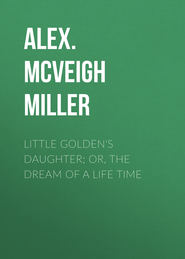По всем вопросам обращайтесь на: info@litportal.ru
(©) 2003-2024.
✖
Pretty Geraldine, the New York Salesgirl; or, Wedded to Her Choice
Настройки чтения
Размер шрифта
Высота строк
Поля
"It was cruelly false," answered Hawthorne, who had heard from Cissy the whole story of the beginning of the acquaintance of the wily actor and the pretty shop-girl. He continued:
"He wished to prevent your further association with Geraldine, so as to keep her away from me."
"And he really intercepted your letter to her? I did not dream he was such a villain."
"He shall answer to me for that injury when we meet again," he said, so sternly that she saw that he was in bitter earnest.
She admired him for his manly resentment, and said, cordially:
"I do not blame you for wishing to punish him. Any manly man would do likewise. As for Geraldine, when she learns of his perfidy, she will turn from him in disgust."
"Unless she has learned to love the villain. Women are so faithful in their love even when the object is unworthy," he sighed.
Changing the subject, she continued:
"Do you know that Sister Daisy is to be married the week before Christmas?"
"Your husband told me."
"Yes? Well, the bridal party are to spend Christmas with me. The other girls—Carrie and Consuelo—are coming, too. I intend to have a theatre party on Christmas Eve—a box to ourselves—and I want you to join us, won't you? And bring some pretty girl with you, for my sisters will have their beaus."
"I don't know any girl," he began, then suddenly remembered pretty Cissy Carroll.
"Oh, yes, I'll join the party if I can get leave. And there's a girl I know—Miss Carroll—the very intimate friend of pretty Geraldine. I'll bring her, if she will accept an invitation."
"Very well, and you may take me to call on her in the meanwhile, and then I can ask her to the dance I'm going to give the girls," replied amiable Mrs. Stansbury.
And so it was arranged that Cissy made the acquaintance of the Stansbury clique, and fell in love with them as deeply as Geraldine had done.
And on Christmas Eve they all filled a box at the theatre—and a merry party they were, for even Harry Hawthorne unbent from the grave reserve that was habitual to him of late, and tried to make himself entertaining to gentle Cissy while the orchestra played and they waited for the first act.
"What is the play?" asked Hawthorne, for Captain Stansbury had secured the tickets, and reserved the name of the piece as a surprise to the party.
"It's 'Laurel Vane'—a society play, by a well-known author—and it is to be presented for the first time to-night," replied Captain Stansbury.
"I hope it is a good company," said his wife.
"Oh, yes—excellent. The Clemens Company. I know the manager well."
There was a start from all, and Mrs. Stansbury said, nervously:
"But I thought that company was on the road."
"They returned to New York yesterday, with this new play," replied the captain, who was not in the secret of Clifford Standish's villainy.
The orchestra stopped playing, and the curtain rose.
CHAPTER XV.
GERALDINE WOULD NEVER FORGET ALDERSON
It thrills one like a draught of rarest wine,
The fine, pure air, the sunshine, and the scene,
The mountains, and the river where it glides,
A silver chain between its banks of green;
And yonder, where the town lies white and low,
On flowery banks so fair beneath the sun,
Oh, Alderson sweet village I may go
Full many a mile, nor find a fairer one!
Mrs. Alex. McVeigh Miller.
Poor, pretty Geraldine, if she had ever thought of death at all, she had never dreamed of ending her life like this beneath the wheels of this great panting, shrieking iron monster, rushing down upon her as her beautiful form lay across the bright steel rails where she had thrown herself in the extremity of despair!
But, frantic with hopeless love and terror at the promise she had just given—the reckless promise of her hand without the heart—reason had momentarily deserted its throne, and, conscious only of a mad desire to escape from life's tragedies of woe, she rushed forward in front of the train, and laid her golden head down upon the pillow of death, like one lying down to pleasant dreams.
And although her suicidal act was seen by fifty pairs of eyes, it was too late for even the most heroic hand to snatch her from her impending doom.
The locomotive was so close upon her the moment she fell before it that the immense cow-catcher touched her, and—even as the horrified shriek of Standish rang upon the wintry air—it seemed to draw her beneath the horrible grinding machine!
Did Heaven, in pity and mercy, intervene to save the rash girl from the consequences of her mad attempt at self-destruction?
Not once in a hundred cases is a human life saved by being caught and thrown upward by the projecting cow-catcher in front of the monster locomotive.
Yet once in a while such a fortunate intervention occurs, and a fatal disaster is prevented.
To poor, reckless Geraldine, who had placed herself beyond the reach of human aid, this accident happened, or our story must have ended here with the tragic close of her short life.
It almost seemed as if invisible angels must have caught up her doomed form from the track and placed it on the great shovel-like projection in safety, so miraculous seemed the saving of her life.
And a moment later the train, which had been slowing up as it entered the town, came to a full stop at the station, and the horrified engineer, who had been utterly unable to prevent what had seemed to happen, saw Geraldine's form lying on the platform of the cow-catcher, where it had rebounded at the first touch, and a cry of thanksgiving rose from his throat, echoed by a hundred other voices of those who had seen it all, and who now rushed to the spot in wild haste.
Quiet little Alderson had a sensation that day never to be forgotten in after years, when the express train rushed into the station bearing on its very front that form of a beautiful girl driven wild by sorrow, until she had tried to end her life in this terrible fashion.
What kind and eager hands drew her from her perilous position; what sympathetic eyes gazed on her beautiful white face as they laid her down on the platform, quite unconscious, for she had swooned when she threw herself on the track.
Every doctor in town was speedily on the scene. They vied with each other in their efforts to restore her to consciousness.
And in a few minutes Geraldine opened her heavy-lidded eyes with a blank gaze, and saw herself surrounded by a sympathetic, though curious crowd, and, as in a dream, heard Clifford Standish eagerly explaining to the people:
"Oh, no, indeed; you are mistaken. It was not an attempt at suicide; it was only a fool-hardy attempt to cross the track before the engine. She declared that she could do it safely, and dared me to follow her, darting from my side before I could restrain her, for I would not have permitted the rash venture otherwise. Still, I believe she would have accomplished the feat and cleared the track by a hair's breadth, only that her foot slipped and threw her down at that fatal moment."
Bending down to Geraldine's ear, he whispered, warningly:
"Do not contradict what I have told them, or they may put you in prison for attempted suicide, as they do in New York."
The people thought he was her lover, whispering to her of his joy at her safety, and in a moment he confirmed the belief by saying aloud:
"She would be distressed if any one accused her of trying to kill herself, for she is one of the happiest girls in the world. In fact, while we were standing on the bridge she had promised to marry me."











